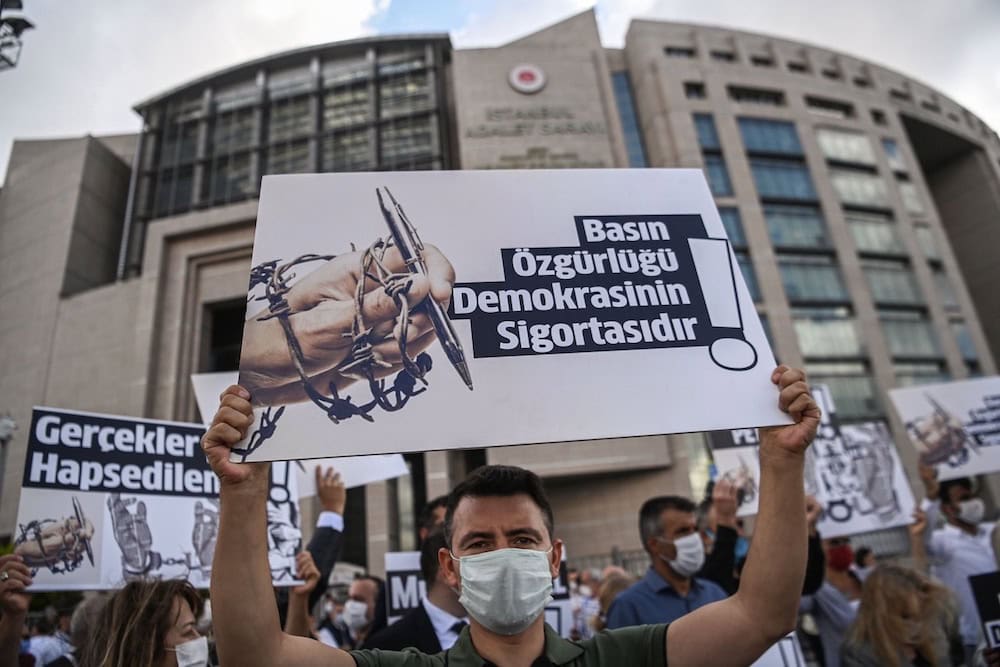Prominent press organizations and rights groups have in a joint letter called on the European Commission and the new European Parliament to strengthen their commitment to protecting journalists’ rights and freedom of expression in their relations with Turkey.
Relations between the European Union and Turkey have been at an impasse for several years, with Turkey, an applicant country, failing to make the necessary reforms required for the membership talks to proceed.
The signatories of the letter include the International Press Institute (IPI), ARTICLE 19, the Committee to Protect Journalists (CPJ), the European Centre for Press and Media Freedom (ECPMF), the European Federation of Journalists (EFJ), PEN International, Reporters Without Borders (RSF), the Turkey-based Media and Law Studies Association (MLSA), the Platform for Independent Journalism (P24) and the Progressive Journalists Association (ÇGD)
They said EU institutions need to find a way to reinvigorate relations with Turkey and ensure that the protection of human rights is front and center of those relations.
Turkey and the EU began membership talks in 2005, but the process has been at a standstill in recent years.
Countries aspiring to become members must align their laws and legislation in 35 policy areas, or negotiating chapters.
EU leaders agreed in 2018 that no new chapters in Turkey’s accession negotiations should be opened or closed.
The rights groups recalled that Turkey’s Justice and Development Party (AKP) government has taken over 90 percent of the media landscape under its control, including direct control over the country’s public media and indirect control over much of the mainstream media through “party-aligned oligarchs” over the more than 20 years it has been in power.
They accused the AKP government of abusing the power of state advertising to create compliant journalism and weaponized the broadcast regulator, the Radio and Television Supreme Council (RTÜK), to routinely target broadcasters with financial penalties for critical news reporting.
It is common for pro-opposition news stations in Turkey to face restrictions on their broadcasting through sanctions imposed by RTÜK, whose board members are appointed in proportion to the number of seats held by political parties in parliament, meaning that the ruling AKP currently dominates the agency.
The rights groups said the capture of mainstream media has been backed by a mass crackdown on independent media, including the arrest of hundreds and prosecutions of thousands of journalists in the years since a failed coup in 2016.
“While the number of journalists behind bars has fallen dramatically, hundreds continue to face prosecution leading to ever growing levels of self-censorship,” said the groups, adding that at least 207 journalists faced trial and at least 22 of them were sentenced to prison or fined with 22 convictions in 2023.
The rights groups talked about a barrage of problems faced by journalists in Turkey, saying they face assaults, trolling and smear campaigns from government-aligned media and that police routinely arrest them at demonstrations and prevent them from reporting, in addition to facing an increasingly restrictive process for obtaining visas to EU member states with delays or visa rejections.
The rights groups therefore urged European governments and policymakers to place media freedoms and fundamental rights at the heart of future relations with Turkey and called on them to facilitate the procedure for Turkish journalists to obtain Schengen visas; provide support, including direct financial grants, to media organizations in Turkey; react strongly to incidents of attacks on journalists and take concrete measures to support journalists, including emergency support; and to develop a clear, comprehensive and consistent relationship with Turkey’s authorities to facilitate the review of policies and the repeal of legislation that is not compliant with international and European standards on freedom of expression.
Turkey, which has been suffering from a poor record of freedom of the press for years, was ranked 158th among 180 countries in RSF’s World Press Freedom Index published on May 3 on the occasion of World Press Freedom Day.


